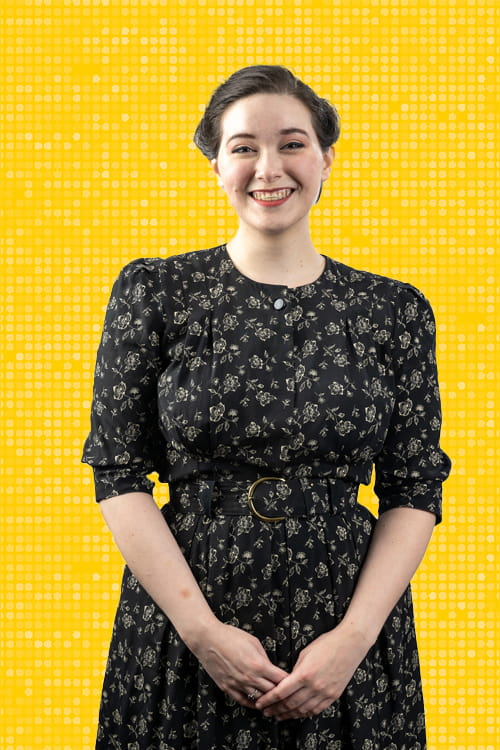
Joy Curry, Undergraduate student, history
Dismantles historical women's fashion
“Joy has approached historical research with keenness, curiosity, and rigor… She excels as a historical communicator and writer, expressing her research results in engaging, creative presentations and essays.” -Elizabeth Yale, assistant professor
Hometown: Cedar Rapids, Iowa
Faculty mentor/advisor: Elizabeth Yale, PhD, assistant professor, Department of History and University of Iowa Center for the Book, and Rosemary Moore, PhD, distinguished associate professor of instruction, departments of History and Classics
What is your degree program and anticipated graduation date? My degree program is the history major with certificates in museum studies and medieval studies. My graduation is estimated for Fall 2024.
Please describe your research: Stays were the garments that predated the corset. They were stiffened with whalebone and fitted to both support posture and give the torso a fashionable silhouette and were worn mostly by women in the eighteenth century. I am studying the ways that staymakers, who were mostly male, interacted with their mostly female customers, and the decisions they made in order to both make the customer satisfied and to fit society’s general standards. I am examining documents from the time and attempting some of the sewing methods myself to get a better idea of how staymaking worked and what staymakers might have prioritized.
In simple terms, why does this research matter? Stays were worn by women across a variety of social classes, and they were seen as important indications of social standing and even moral quality. Looking at how stays were made, how much control both the maker and the purchaser had over the design process, and the economic or social factors that both parties would have to consider can demonstrate important nuances of eighteenth-century ideas surrounding gender, class, and propriety. Understanding these things can help us in the modern day think critically about how we dress, how our clothing is made, and what our choices say about our lives.
How soon after starting at the University of Iowa were you able to participate in research? I began this research after my third semester at the University of Iowa.
How has being involved in research made you more successful at the University of Iowa? Being able to design a research project has been an excellent opportunity for growth. It has enabled me to follow my curiosities to in-depth understanding while also building skills in project management and professional communication. It has introduced me to new methods of historical research and has made me better at the methods I was already familiar with.
What are your career goals and/or plans after graduation? I plan to attend graduate school to further my studies and continue to grow in both knowledge and skill. Ultimately, I want to work in an academic setting, be it a university, museum, or other institution dedicated to furthering historical understanding.
Banner location: Downtown—
